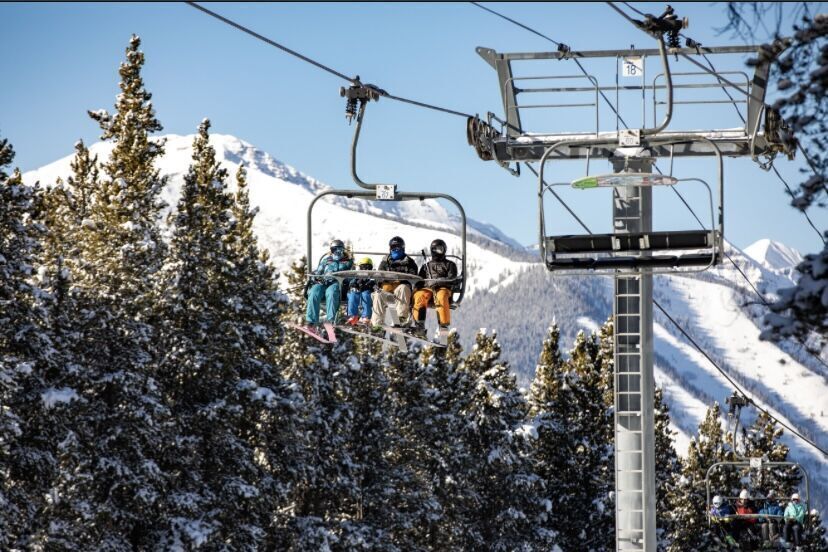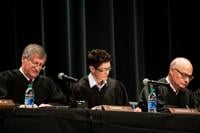Colorado Supreme Court allows certain negligence claims for ski lift injuries, regardless of waiver
The Colorado Supreme Court on Monday decided an Oklahoma man and his daughter could pursue a negligence claim against Vail Resorts for a debilitating ski lift injury, notwithstanding the waiver they signed assuming “all risks.”
The ruling implicated competing policy concerns for the multibillion-dollar ski industry and the millions of chair lift riders annually. Specifically, do the rights of customers to sue for injuries attributable to resort operators’ negligence take a backseat to ski resorts’ ability to protect themselves through broad liability waivers?
Annalea “Annie” Miller was 16 years old when she fell 30 feet from a chair lift at Crested Butte Mountain Resort. Her father, Michael D. Miller, filed suit alleging Annie’s injuries — which resulted in her paralysis — were the product of the operator, Vail Resorts, failing to exercise the appropriate level of care in running the lift.
The Millers brought three claims based on varying legal theories. A trial judge permitted the claim for gross negligence to proceed and no one challenged that decision. However, the remaining claims raised the question of whether ski lift users, in waiving their right to sue when they purchase tickets, can override that waiver and hold ski operators liable.
By 5-2, the Supreme Court issued a qualified “yes.”
All members of the court agreed the waiver Michael Miller signed on behalf of his daughter was valid and addressed the risks of “using the lifts” and “falls.” Therefore, the Millers could not sue Vail Resorts and Crested Butte for failing to use the “highest duty of care” in letting Annie fall.

However, the majority determined Colorado law and regulations require ski lift operators to take certain steps to ensure skier safety, and customers cannot waive away their right to sue a resort for allegedly violating those rules through their negligence.
“Because we have concluded,” wrote Justice Richard L. Gabriel, “that Crested Butte, in fact, owed statutory and regulatory duties to Miller and to Annie, we further conclude that Crested Butte could not avoid those duties by way of private release agreement.”
Justice Monica M. Márquez, writing for herself and Justice Melissa Hart, believed neither of the Millers’ claims on appeal was viable. She argued the Millers were fundamentally attempting to sue for negligence through different avenues, but the liability waiver applied across the board.
Lawyers for Vail Resorts did not immediately respond to a request for comment.
“This decision is a big victory for ski safety in Colorado. It won’t give Annie Miller back the use of her legs, but it will give her and others a better shot at justice when they are injured as passengers on chairlifts,” said Bruce Braley, an attorney for the Millers.
The case attracted the attention of multiple outside organizations. The National Ski Areas Association, representing the vast majority of ski operations, wrote that chair lift accidents are rare and are typically the fault of customers, rather than operational failures. A legal brief from Colorado’s ski areas, outfitters and other providers in the $14 billion outdoor recreation industry warned that making it easier to override liability waivers and sue over accidents will cause programs to shut down.
“Without the benefit of enforceable releases, many if not most entities in Colorado that provide youth recreational opportunities will have to charge significantly more for those opportunities,” the groups wrote. “Significantly rising costs for youth activities creates a pernicious effect, where only the children of privileged parents will be able to have their children engage in such recreational activities.”

From left, Colorado Supreme Court Justices Richard L. Gabriel and Monica M. Márquez and Chief Justice Brian D. Boatright listen to an argument during a Courts in the Community session held at Pine Creek High School in Colorado Springs on Thursday, Nov. 17, 2022. (The Gazette, Parker Seibold)
After Annie Miller’s March 2022 fall from the chair lift, her father sued Vail Resorts, alleging he screamed for an operator to stop the lift as his daughter struggled to hold onto the vehicle. Broomfield District Court Judge Sean Finn refused to throw out Michael Miller’s claim of gross negligence, but he agreed to dismiss the other negligence claims, reasoning the waiver signed on Annie’s behalf immunized Vail Resorts from liability.
On appeal, two areas of the law appeared at odds with each other. On the one hand, ski lift operators owe the “highest degree of care” to customers. On the other hand, parents may waive any potential claim of negligence on behalf of their children.
Some justices signaled their discomfort during oral arguments with the idea that companies could avoid the duties imposed by state law by getting customers to sign away their right to sue.
“If you want to ride the lift, you have to sign a waiver. And yet, we have a situation where the legislature is saying, ‘Hey, ski industry, these are the standards that we expect,'” observed Justice Carlos A. Samour Jr. “And the ski industry turns around and says, ‘Well, that’s nice of you. Thank you. But we’ll just make people waive and be done with it.’ Something about that is wrong.”

Colorado Supreme Court justice Carlos A. Samour, Jr. takes notes during oral arguments of the Arnold R. Martinez v The People of the State of Colorado case during Courts in the Community on Thursday, Oct. 26, 2023, at Gateway High School in Aurora, Colo. (Timothy Hurst/Denver Gazette)
Although the Supreme Court’s majority did not categorically invalidate the Millers’ waiver, the May 20 opinion did find the signing of a waiver did not absolve Vail Resorts of its obligation to operate the ski lift according to state law and regulations.
Márquez, in her dissent, believed there was “nothing otherwise magical” about a negligence claim based on a violation of state law. She reiterated her observation from oral arguments that the Millers already had a way to hold Vail Resorts liable — gross negligence.
“It seems to me that the allegations of the complaint actually set out a pretty solid claim for gross negligence,” she said previously. “If no one was there, if no one was paying attention and the lift kept operating, that seems like gross negligence to me.”
The case is Miller v. Crested Butte, LLC.









